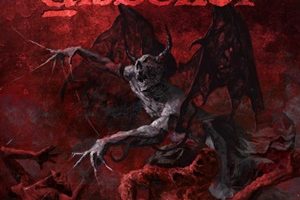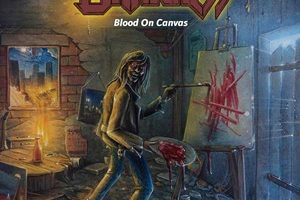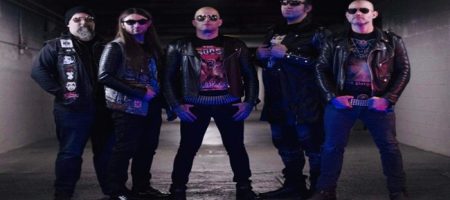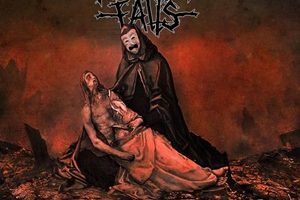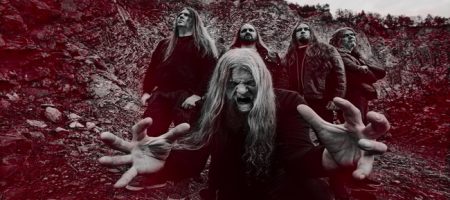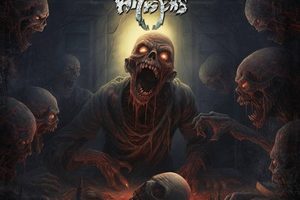Dust Bolt – Follow Your Instincts
Tuesday, 6th February 2024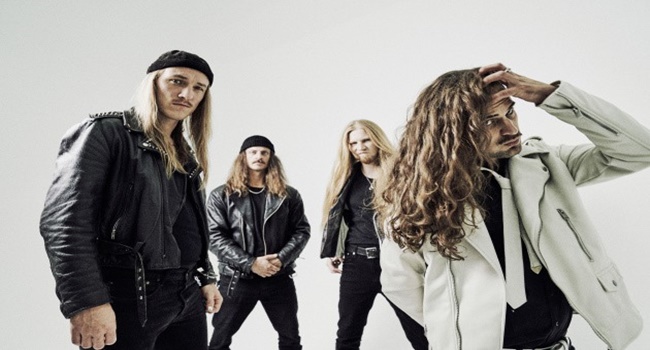
Photo: Niklas Niessner
Growth is a constant factor as we age. We absorb, collect, and process new experiences. We shouldn’t be surprised that coming out of this global pandemic, many artists in the metal scene have also reassessed themselves to often create new songs or records that reflect a different viewpoint than previously delivered. Case in point – German quartet Dust Bolt. Probably best known for their thrash metal platform, their latest record Sound & Fury represents a vast twist on the formula – adding in more bluesy, groovy, or grunge/melodic aspects that expand the conventional sound people may know of these gentlemen. Still speedy in certain songs, other tracks emphasize a more united spirit in a thoughtful template, or reflective/quieter in other spots as the closing track “Little Stone” illustrates.
We reached out to guitarist/vocalist Lenny B. who brought us up to date on this stylistic shift or new chapter of the group. You’ll also learn more about his confidence in changing his vocal approach for these new songs, his struggles with social media, his bright outlook on new label AFM Records, his concerns for a younger generation to hopefully keep the metal scene alive, and future touring plans including hopefully some North American dates.
Dead Rhetoric: Sound & Fury is the fifth studio album for Dust Bolt. You mentioned in the background information that after your previous album Trapped in Chaos that things were getting more complicated in your lives now that your older – plus the pandemic occurred which allowed you to take a break and reassess everything. Can you discuss how this down time fueled this latest set of material and new creative inspiration to go into fresh, dynamic areas that may differ from your previous work?
Lenny B.: Wow, yeah. You have to imagine that we started so young as four friends, being 12 and 13 when we started the band. Until the pandemic hit, we were just going for it, it was all about the band. We were living and thinking about gig to gig. Suddenly, reality happened as we lost the first bass player Bene. M. back in 2020, and we did a European tour in 2020 with another bass player. Right after that tour, the pandemic hit. Suddenly these young kids going from just caring about the band, and being on the road, we were now stuck at home with a break. That was a game changer for us. I wouldn’t say it was all bad. It came at the right time for us honestly to reflect on what we did so far and figure out, is this something that we want to do for the rest of our lives? Are we going to take this seriously or is this just some young kid thing?
This question suddenly appeared, and we took some time to think about the question. For me, I was used to immediately heading to the studio. It gave me some time to do more producing, and I never really had the time for it. After a year the three of us left met in the studio, everybody was like I miss you and I wrote some songs I need to share them with you, we have to do them as Dust Bolt. It was a natural thing and a natural feeling that brought us back together. And then we had this strange time of not being on a stage, not being out there on social media, not using social media for two years, and that was the best thing ever for a musician (laughs). Not having those claws of people expecting you to do something in particular.
It was a perfect time for us to navigate this beast and see where it’s going to go. For me that meant getting to be the singer that I always wanted to be. I never had… I was a little bit afraid; I was not confident enough. I was not confident enough to experiment the way I wanted to experiment, try out things. It’s now or never, we have to do all this right now and see what comes out in the end. Sound & Fury is what came out, and it’s an interesting ride and an interesting album.
Dead Rhetoric: How did it feel to evolve as a guitarist and vocalist through this album? Are you proud of the fact that you were willing to trust your instincts and venture into new territory – and how did you get over your fears of acceptance, as we know that change can be difficult for long-time listeners to handle in their favorite bands?
Lenny B.: That’s a good question. I don’t like the word proud too much, but I am proud that I did follow my instincts, follow my gut feeling. I was thinking so much about music, and I’m still every day learning about music. The more I learn, the more I know about how it’s done. Following your instincts is the only way that you should go. Not thinking about the audience, because the thing is, we are a rock and roll band and we play really heavy music. It’s an extreme form of art. If I would really care about people really liking it, I would rather do pop music. Being a punk, being a rocker, being a metalhead, I don’t care about getting accepted. Once I realized this, I said to myself just go for it and see what happens.
Now there are also some people that are confused about the changes, or development of the band. At the same time, there are some people that have said they were hoping so much for this. We are so happy that you did this, and you had the balls to do it, because somebody has to do it. For me as an artist, I want to stay interested in what I’m doing. I don’t want to know what I’m going to do; I want to go for it and see what comes out. We feel proud and confident with who we are now as musicians.
Dead Rhetoric: You’ve released five singles/videos to date over the past year for the new record. Do you believe this helps people prepare for what they’ll hear on the full record, and did you do this to reestablish the presence of the band after so many years between records?
Lenny B.: It was also an experiment because times are changing so fast in the music industry, because the music industry is moving so fast. I’m still a young kid, but I’m not a guy who’s using Spotify too much. I’m not listening to playlists, because I don’t like somebody else telling me what to listen to. It’s a personal thing. On the other hand, it was a question that if this album is something different, maybe we should also be open enough, willing enough, to try a different way than releasing a single with a music video, and then here’s the album. In these times, you may have a great song in position nine on the album, but people will not listen to it or notice it because people don’t listen to full albums as much anymore.
I’m not afraid of the fact that people will buy vinyl and will listen to the whole thing, but there are so many kids these days who are so much more focused on singles. For us, it was like, let’s try this and see what happens. I didn’t realize that this means we were going to do six music videos, it’s pretty exhausting as we are more musicians than we are video makers. In the end, it’s always hard to choose the singles. If you ask people, what do you think should be the first single, ten people will give you ten different opinions. It was the same here. We went with the instinct, gut feeling. In the end, listening to an album front to back is the only way to understand what the band was trying to say.
Dead Rhetoric: You are now a part of the AFM Records roster after finishing your record deal with Napalm Records. How do you feel about the label switch, the staff/promotional team at your new label, and where have you seen the differences in how they approach Dust Bolt in trying to push your music and expand the fanbase?
Lenny B.: Well, I cannot say something bad about AFM. The thing was for us, we were looking for somebody who understood where we want to go as a band, who understood that of course it would be the easier way to stay 100% thrash metal, use 100% thrash metal cover art work, nothing can go wrong with that. But we needed people who were willing to risk something, who saw the potential of the band and where it could go from there on. With adding more melody, adding more singalong parts, some bluesy stuff here and there, different influences. AFM were the guys that told us if we would have done another thrash record, we would not have cared, but hearing this, this is interesting, and we want to support you guys and go on a journey with you. And that was the reason we chose them; they got the idea that we want to approach things a little bit differently than the way other people expected.
Dead Rhetoric: Because this is a different type of record, were you very conscientious of what type of cover art to present from the band?
Lenny B.: Honestly, choosing cover art for me is a really hard thing to do. Because I’m a musician, I’m not a painter. We always have to go with something that somebody else does for us. We are DIY people; we want to do as much as possible that we can by ourselves. Feeling that, we had this weird picture from a photoshoot that was kind of stuck to us. It was funny, and somehow it describes the band and its different characters really good, while being completely opposite of everything that the people expected us to do. We wanted to show the people that we have the balls to do a cover artwork like this. It could be something The Beatles would put out. Maybe this will still work in 30 years. You wouldn’t expect a metal album from the cover. This was something that everybody would tell us not to do that, so let’s do it.
Dead Rhetoric: Did you take more risks with where you wanted to go lyrically as well for the album?
Lenny B.: We took some risks… I didn’t think about it. I felt like I was always hiding behind some typical metal metaphors, metal lyrics, words and stuff. If this album is 100% honest in what I feel, then I should start writing down what I feel and be brave enough to share it with people. The lyrics are the theme – a reason. If I scream into a microphone, there has to be a reason or something that makes me want to scream, how can I put that in words? That was my challenge for the lyrics.
Dead Rhetoric: What challenges do you believe Dust Bolt currently faces at this point in your career? What steps / actions need to occur in order for the band to build more of a following and move up the ladder for bigger / better opportunities?
Lenny B.: Of course, the danger is that you will lose some fans that we worked so hard for the last sixteen years since we found that we were going for it, playing live everywhere. We were able to get some people’s attention through that. You could lose that when you change up things, and of course that’s a big risk. We don’t want to hurt anybody who’s a Dust Bolt fan – not at all. If I know I have to go on tour and play eighty shows next year, I want to make sure that I 100% feel what I’m singing when I do eighty shows. I don’t want to be an actor.
We are coming back to the main topic – to follow your instincts. At some point, if we follow our instincts, and something different than a typical thrash metal band comes out, that’s what we are aiming for and where we always wanted to be. We opened the door to a new chapter and a new world with this new album. From there on, we can do so many interesting things in the future. People might start taking us more seriously as musicians, in general, and not just the genre of thrash. Maybe they will see that these guys did their homework, they know how to play the blues, how to sing a grungy, hard rock chorus. I was always a fan of bands that did stuff like that. If you take Judas Priest, I love the fact that you can listen to Painkiller and go back to listen to their 70’s stuff which is more radio, hard rock stuff and it’s still Judas Priest, I love both. I can switch within one band, depending on my mood, and that is so cool. You can build a cool set list for playing live.
It’s like a dynamic. Not just every album and every song being in your face, like 100% metal. Take a deep breath, do a slower song – because when you play a faster song, it kicks even more.
Dead Rhetoric: Where do you see the current state of heavy metal – and thrash – in particular? What do you enjoy most about the style, and what changes (if any) would you like the musicians and fans/followers to take into consideration for the greater good of all parties involved?
Lenny B.: Well, I feel to be honest, this state of heavy metal and rock and roll music is in a little bit of a dangerous place. Because the way I got to know music was going to small, local club shows near where we lived, some metal and punk kids would make some shows. Five Euros, five bands. Things like that, people were going for it, trying it out. When I saw people doing that, I was like wow – you can go out on stage and scream your emotions into a microphone, this is great. The most important thing is we need to get the attention of the young kids, because those kids are making the next bands, continue to play instruments instead of sitting on a computer to use these keyboards to create stuff. It’s easier to be at home of course than going to a rehearsal room and producing a song. The whole metal and rock scene has to learn again how to tell the young people about the beauty of rock and roll. It’s not just the music your dad listened to, or about the bands that were popular in the 80’s. There are cool bands right now, people who are waving the rock and roll flag, and for me there’s nothing more beautiful than hearing the feedback from a guitar amplifier. I don’t want a band to be comfortable on stage, with the right makeup, super quiet, where everything is perfect.
The mistakes, the roughness, that got my attention as a kid – I felt like I am not perfect, I don’t play perfect, but I feel something when I am playing. Rock and roll is about attitude and feeling. We need to start telling the next generation so that they keep up the good work with rock and roll music. Some parts of the metal music are too clean and perfect, I miss the Iggy Pop-type vibes in there. That’s what we are aiming for.
Dead Rhetoric: You’ve mentioned on your personal Facebook page the ease with which people level criticism when not liking something or handling musicians/artists that change – especially in comment sections on social media platforms. Do you believe it’s harder to be positive versus spewing negativity, and where would you like to see humanity evolve and grow down the line?
Lenny B.: I am still learning, but I think social media… it’s not a beautiful place to go. Doing something in order to be liked is dangerous. You should do what you feel and want to do, not what other people might give you a thumbs up about. What does get a thumbs up is often not the beautiful stuff, it’s the shocking stuff. You can hide behind your profile and slam other people, be like a really rude person and get along with it, get away with it. We worked so hard all these years on having a culture, getting along with each other, going to concerts and going to restaurants and talking with each other even if you have different opinions. It’s great to discuss, learn, and talk about things. That’s what I miss on social media. It feels like one way direction. You post something, this is my idea – and then people start shitting on you. Take a second.
It’s weird because all the music marketing these days goes through social media. It’s up to the bands to do that. I don’t think Jimi Hendrix had to care about making a poster for his show, or saying on social media, ‘hey this is my album – buy it!’. We have to do this by ourselves now. It’s okay, but this whole section should not get more importance over the actual music. And this is something I struggle with. I want to meet my friends and play guitar, not spend my time on a mobile phone doing Instagram posts that are gone in a second.
Dead Rhetoric: If you had the opportunity to teach a high school or college-level course about any subject matter outside of your expertise in music, what sort of subject would you teach and why do you think this area is important for people to learn about?
Lenny B.: I would say social science and politics. Not in terms of parties and what to do, but this weird thing of people on this planet trying to figure out a decent way to live together. We’ve been trying this for so long, and as you see in the last few years, we are going back to a time that is more violent again, more wars, crazier and crazier. Knowing what the beauty of democracy is, participation of the people, expressing your opinion, being free. We take that for granted sometimes, and especially in my generation because we grew up with that. You have to care about this all the time, and fight for this.
Dead Rhetoric: What has the genre of heavy metal meant to you? Can you think of a specific instance or two where a band or album pulled you through some tougher times to turn things around in a positive light?
Lenny B.: Absolutely. For me, there’s nothing more than music. I’m so grateful and thankful that I found music that spoke to me when I needed it. Music that kept me alive, music when I felt alone and desperate. There were people in the music, singing about exactly the same stuff that I felt. I was not alone. And I might go to a concert and a show, and you might meet other people that are as fucked up in the brain as you are, maybe. You start getting into a mosh pit, headbanging together, drinking beers together, and you make friends. Pick up an instrument, make a band – it’s all thanks to music. And for me that was through heavy metal music, that got my attention. Feeling the energy, it’s more beautiful than anything.
Dead Rhetoric: What’s on the agenda for the next twelve months for Dust Bolt related activities? Where do you hope to tour or what do you hope to accomplish that you haven’t been able to achieve to date?
Lenny B.: Sound & Fury feels like the beginning of a new chapter for us. We are hungry, we want to play, we have the energy. We want to tour and play everywhere possible. We are going to do Germany now, the UK in April, a few shows in Austria, France, go to the US in September or October hopefully, we are working on that. We just want to go everywhere, get inspired, meet people. I can’t wait to go back and make the next album, I’m excited about the future and writing more and more material. Bringing Dust Bolt out to the world!











